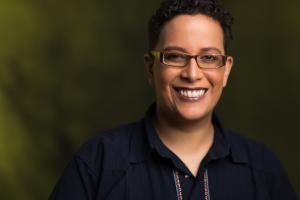Fall 2015: CSWS Research Matters See also: A Public Performance
“LANDLINES” by Ana-Maurine Lara, Assistant Professor, University of Oregon, Department of Anthropology
LANDLINES is a performance poetry project funded through the Oregon Arts Commission, and which explored ideas of home and homeland. This latest issue of CSWS Research Matters explores the research behind the project.
Dr. Ana-Maurine Lara writes: “Landlines is a performance that asks questions about history, memory, home, homeland, and land. It is an exploration of how we embed our understandings of home in our landscapes, and how conflict arising out of disparate relationships to home and homeland actually constitute spaces of possibility. Landlines attempts to witness the gaping wounds of history here in Eugene, to build on memory in order to find new meaning. If as an artist, an activist and a scholar, I take settler colonialism seriously, then what are the histories I must be accountable to as who I am, as an indigenous person far from homeland, as a queer person of color, and as a Jew?
“The idea of the landlines as the conceptual container emerged from the visual element of the eruv: a ritual wire enclosure strung between light poles. This is done so that on the Jewish Sabbath, Jews may carry things outside of their homes. The eruv expands the possibilities for Jewish community, but it also expands the private space of the home into public space. There is no eruv in Eugene. In fact, there are few eruvim around the world. Sophie Calle’s photo-text installation, Public Spaces–Private Places, was particularly inspiring for me. In this piece, twenty photographic panels of an eruv on the West Bank recreate the contained public space. She accompanies these with text from fourteen interviews she conducted with Palestinian and Israeli residents. By bringing both image and text together, she presents the complex contradictions of land and home implicit in this space.
“I originally came up with Landlines in 2007, when I was living in Texas, and the U.S. was deciding whether or not to extend a wall across the Texas-Mexico border. I was in conversation with Margo Tamez, whose family and nation were fighting to maintain sovereignty—the U.S. government was using the eminent domain clause to overlook and deny the sovereign treaty rights of the Lipan Apache people. And I was witnessing the displacement of 60,000 families (the majority migrant families) from Eagle Pass, as well as the plans to have the wall pass through the University of Texas–Brownsville, essentially dividing the campus into two international spaces. As someone who deeply believes in the rights of indigenous peoples and migrants, I was angry. As someone who sees the inherent conflict between these two ontological realities (which is not always material), I was heartbroken. ”
For the complete publication: Fall 2015: CSWS Research Matters


